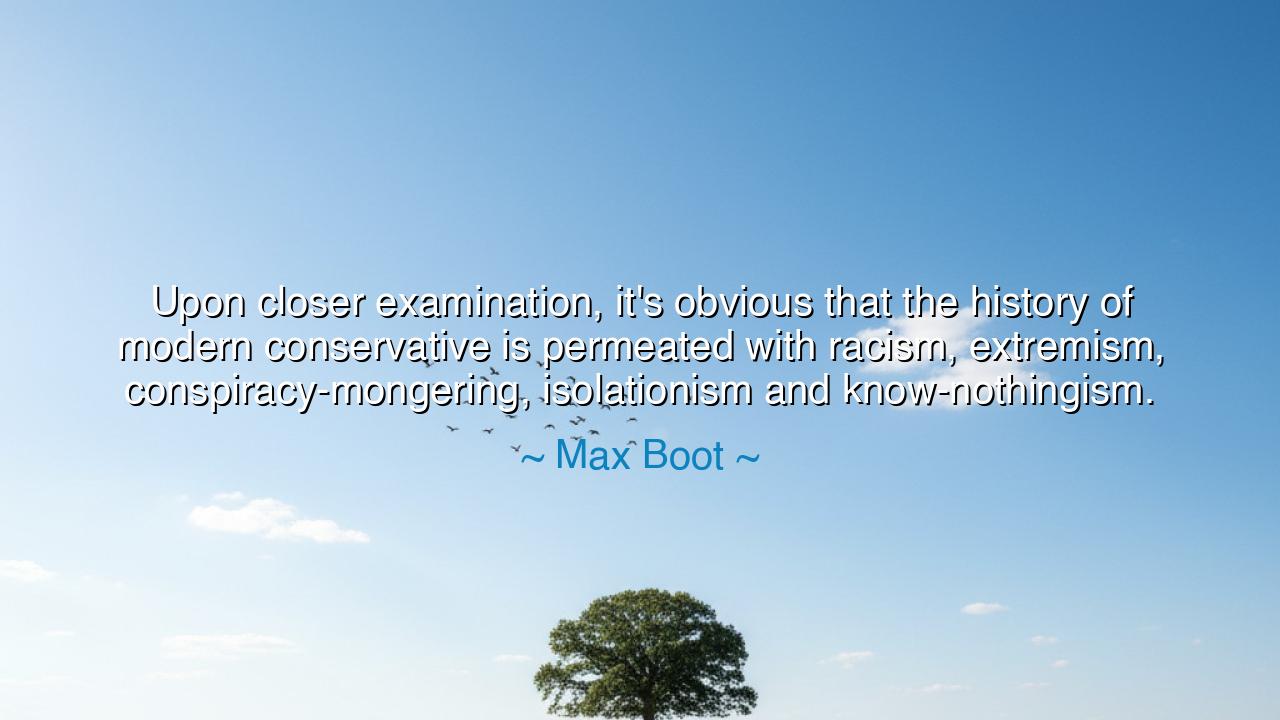
Upon closer examination, it's obvious that the history of modern
Upon closer examination, it's obvious that the history of modern conservative is permeated with racism, extremism, conspiracy-mongering, isolationism and know-nothingism.






“Upon closer examination, it’s obvious that the history of modern conservative is permeated with racism, extremism, conspiracy-mongering, isolationism, and know-nothingism.” Thus spoke Max Boot, a historian and political thinker who once walked among the ranks of the very movement he now critiques. His words, though sharp, are not meant as mere condemnation—they are a lament, a reckoning, and a call to remembrance. In them, we hear the voice of one who has looked deeply into the mirror of ideology and seen not only light but shadow. He speaks to the ancient truth that no philosophy of power escapes corruption when it forgets the virtues of truth, compassion, and humility.
The meaning of Boot’s declaration lies not in the attack of one political faction, but in the warning to all who love power more than principle. He reminds us that ideas, however noble in their birth, may decay in their execution. Conservatism, once rooted in order, duty, and the preservation of what is good, can be overtaken by fear, prejudice, and rage when it ceases to evolve. The racism he names is not always the overt hatred of the past, but often a quieter blindness—the refusal to see the humanity of the stranger. The extremism he describes is the distortion of conviction into fanaticism. And conspiracy-mongering, that fever of imagination, replaces reason with paranoia, until truth itself becomes the enemy.
History, that eternal teacher, offers countless reflections of this warning. Consider the tale of the Know-Nothing movement in nineteenth-century America—a faction that arose proclaiming patriotism while feeding on fear of immigrants and the foreign-born. They called themselves defenders of national purity, yet their purity was built upon exclusion and suspicion. Their fire burned bright and brief, but their spirit did not die; it reemerged in new guises across generations, clothed in different rhetoric but animated by the same distrust. It is this know-nothingism—the rejection of knowledge, the suspicion of the learned, the worship of ignorance—that Boot names as the most dangerous corruption of any political faith.
The isolationism he condemns, too, is ancient in spirit. Once, great civilizations turned inward out of pride or fear, believing themselves sufficient unto themselves. China in the Ming dynasty, mighty and cultured, closed its gates to the world; its fleets, which once reached distant seas, were burned by its own hand. In that withdrawal, the empire’s brilliance dimmed. Likewise, when nations today shun the global community, when they retreat into the walls of nationalism and forget the shared fate of humankind, they repeat the same tragic cycle. For isolation may protect for a time, but it suffocates the spirit in the end.
Yet Boot’s words, though somber, are not a curse but a summons. He calls us to look upon our own beliefs—whatever they may be—with honesty. To “examine closely,” as he says, is an act of courage, for self-scrutiny is the beginning of wisdom. Every movement, whether conservative or progressive, must guard against the rot of pride and the seduction of fear. When a philosophy forgets its moral roots, it becomes hollow; when it clings to power over truth, it ceases to serve humanity and begins to devour it. Thus, Boot’s critique transcends politics—it becomes a moral reflection on the human condition itself.
Consider the story of Edmund Burke, the father of modern conservatism. He warned against both revolution and tyranny, seeking instead the harmony of change rooted in tradition. His conservatism was not blind obedience to the past, but a reverent dialogue with it. He believed in duty to both the living and the unborn. Yet when later generations forgot this humility—when they turned preservation into stagnation and reverence into fear—his philosophy was twisted into something he would scarcely recognize. Boot’s lament is the echo of Burke’s warning: that without self-restraint, any ideology, however noble, can become an idol.
So let this teaching be carved into the hearts of those who lead and those who follow: beware the comfort of certainty. The moment we cease to question our own beliefs, they begin to consume us. Let your convictions be strong, but let your conscience be stronger. Stand for principles, but never for prejudice; defend your nation, but never against the humanity of others. To reject knowledge, to silence reason, to mock compassion—these are the signs that the soul of a people has begun to fade.
And thus, the wisdom of Max Boot endures not as condemnation, but as prophecy. He reminds us that no ideology is beyond corruption, and no generation is beyond redemption. The cure for decay is not despair, but renewal—the courage to confront our darkness and rebuild upon the foundations of truth. Let us, then, be guardians not of a creed, but of conscience. For it is not “conservatives” or “liberals” who will save the world, but those who remember that the truest politics is the pursuit of wisdom, and the highest wisdom is the love of truth.






AAdministratorAdministrator
Welcome, honored guests. Please leave a comment, we will respond soon